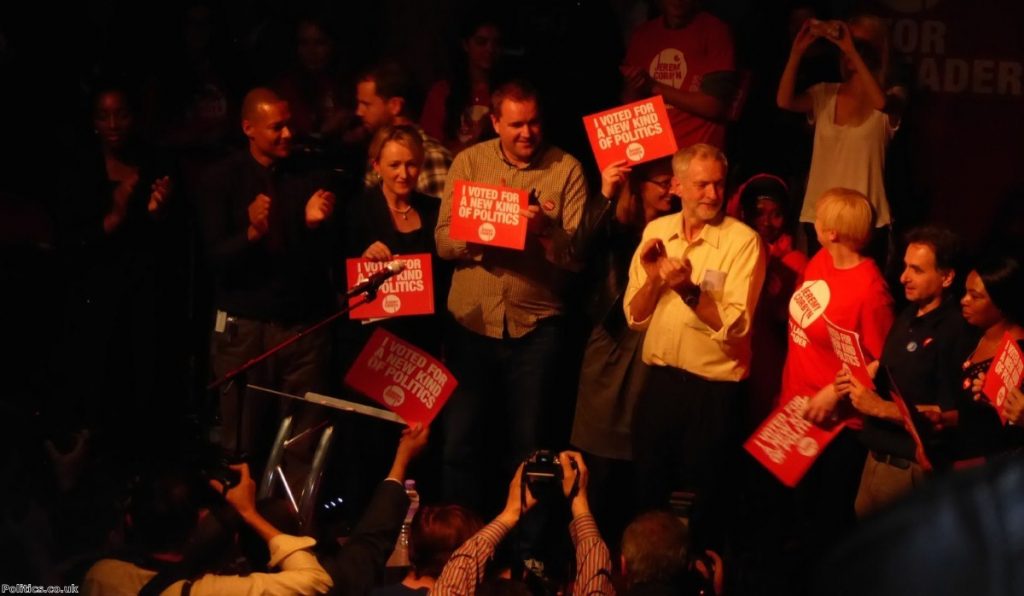Tears and jeers: An evening with the Corbyn faithful
What is the appeal of Jeremy Corbyn? I was pondering this question as I sat in the rafters of the Rock Tower, an impressive venue in Islington which doubles up as a Nigerian church.
Beneath me was a crowd of hundreds of Corbyn's supporters whipped up into a state of semi-fervour by the appearance of the man they now refer to as 'JC'.
By the time Corbyn shuffled in front of the microphone, the audience had already been primed by a series of energising speeches by John McDonnell, Len McCluskey, Owen Jones and numerous other MPs and local supporters. Many of them spoke about the 'positive' nature of Corbyn's campaign, but a large part of their speeches also involved gripes at Corbyn's enemies. Tony Blair, who recently claimed supporters of Corbyn required a "heart transplant" understandably received a number of jeers from the audience. However even Corbyn's current rivals didn't escape their scorn, with McCluskey saying that listening to Cooper, Burnham and Kendall had made him want to "slit my wrists."
However most of their ire was reserved for Corbyn's enemies in the press. In the first ten minutes of the event alone, I counted five separate complaints about journalists. Speaker after speaker, stood up to complain about the 'vicious' media and its 'smears' against their man. McDonnell told the audience he had recently received a phone call from somebody introducing themselves as a journalist from The Sun. "I said look, you can be one or the other, but you can't be both," he quipped. Jones warned that the press "onslaught" about to hit their man would be the worst they'd ever seen, while another of Corbyn's local supporters suggested that even the BBC and ITV were mounting attacks on JC "in their own subtle ways."


After an hour or so of this I looked down at my dictaphone and began to fear I might soon be rumbled as a member of the hated journalistic fraternity and chased pitchfork-first out of the hall. Thankfully that didn't happen and I was allowed to stay undisturbed in my seat while Corbyn began his speech.
Big reception for Corbyn pic.twitter.com/O2biC8J3gZ
— Adam Bienkov (@AdamBienkov) September 10, 2015
The first thing I noticed when listening to Corbyn is that by any conventional standards he's not a particularly impressive speaker. Before he stood up, the audience had been treated to a truly barnstorming speech by Owen Jones. Jones has faced a lot of criticism from some quarters for his loyal support of Corbyn during this campaign, but there was no doubt from listening to his passionate speech last night that he genuinely believes in the cause he's fighting for. It was a masterful, almost evangelical performance.
But if Jones was like an evangelical preacher, then Corbyn was much more like the local vicar. His plodding, one-pitch style was, to my ears, something of a comedown from all the previous speakers. It had nether the bombast of Jones or McCluskey, the humour of Clive Lewis MP, nor the emotional connection of some of the local activists and councillors.
And yet the crowd seemed genuinely moved by it. Unlike many other political rallies I've been to where the audience often look like they've been held there at gunpoint, Corbyn's supporters actually seemed to want to be there. The welcome he received was warm and genuine. When Jones told the audience they were all a "part of history" you could sense they believed it. As Jeremy began to speak, a woman behind me started to silently weep. It was a touching, if slightly bizarre moment.
Corbyn is not a conventionally impressive speaker
Corbyn's speech itself was filled with simplistic binary choices. He said his foreign policy was for nations to "get on with each other, not go to war with each other" that Britain should be "good for the world not dangerous to the world". For a non-religious man, Corbyn's worldview felt remarkably black and white. For Corbyn there seems to be good guys and bad guys, war and peace, rich and poor, and very little in between.
Perhaps therein lies the root of his appeal. In an era when British politics has become so narrowly based, with the two main political parties arguing over the same small patch of ground, there is something refreshing about Corbyn's willingness to give simple solutions in plain language to simple questions.
As one of his supporters told me last night: "Being a great speaker isn't the point. People want to hear things which haven't had a public airing for many years."
Of course in reality, they have had plenty of airing. Numerous politicians have been pushing similar politics for decades and yet none of them have managed to get anywhere near the kind of reaction as Corbyn has. When Diane Abbott stood on a similar platform five years ago, she came in fourth place. For that reason there must be something particular about Jeremy himself that has captured his followers' imagination.
As I looked down at the Corbyn faithful last night, I couldn't quite work out what it was. But whatever it is, it soon looks set to deliver what will be the greatest victory for the Labour left in recent political history.













